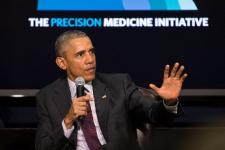The White House Is Pushing Precision Medicine, but It Won’t Happen for Years
By Mike Orcutt,
MIT Technology Review
| 07. 18. 2016
With the right technologies to collect and make sense of biomedical information, we could speed up the pace of discoveries that lead to a new class of tailor-made drugs. That’s the argument behind the White House’s push for “precision medicine” (see “A Shot in the Arm for Obama’s Precision Medicine Initiative”).
The goal of precision medicine is to provide drugs and therapies that are uniquely suited to individual patients based on their genetics and other distinguishing health information. To a small degree, that already is happening. Dozens of targeted drugs have gotten approval from the U.S. Food and Drug Administration in recent years, and there are particularly successful examples in oncology. But despite the early successes, we are many years from realizing a “new era of medicine” the president described in his 2015 State of the Union address—if we can realize it at all.
Here are four reasons why:
Continue reading on MIT Technology Review
Image via Flickr/DoD News
Related Articles
By Pete Shanks
| 02.27.2026
Last month, we published “The Shameful Legacy of Tuskegee” which focused on a proposed experiment in Guinea-Bissau. The study’s plan echoed the notorious Tuskegee disaster, withholding safe, effective vaccines against hepatitis B from some newborns while inoculating others. It was to be financed by the U.S. but performed by a controversial Danish team. That project provoked a multi-national outcry, leading to a remarkable response from the World Health Organization:
WHO has significant concerns regarding the study’s scientific...
By Jenn White, NPR | 02.26.2026
By Kiana Jackson and Shannon Stubblefield, New Disabled South | 02.09.2026
"MC0_8230" via Wikimedia Commons licensed under CC by 2.0
This report documents a deliberate assault on disabled people in the United States. Not an accident. Not a series of bureaucratic missteps. An assault that has been coordinated across agencies...
By Scott Solomon, The MIT Press Reader | 02.12.2026
Chris Mason is a man in a hurry.
“Sometimes walking from the subway to the lab takes too long, so I’ll start running,” he told me over breakfast at a bistro near his home in Brooklyn on a crisp...




